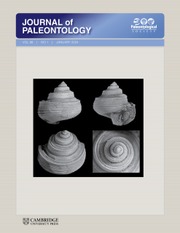
Hello to friends and colleagues around the world. I would like to start by thanking my nominators and the Paleontological Society for this award. I consider this the highest honor that I could receive at this stage in my career, and I take a great deal of inspiration from past Schuchert awardees as I look forward to what might come next. I also don't want to miss this chance to acknowledge how much I have benefitted from a generous scientific community. Like awardees before me, I have many people to thank.
Early on, Rob Dunbar at Stanford, and Cynthia Dusel-Bacon and Steve Ludington at the USGS, provided critical research and field experiences, and didn't get too upset when I decided to go sideways into paleontology for graduate school. That decision can be blamed on Jim Ingle, who recommended that I read Andy Knoll's “Life on a Young Planet” and then provided invaluable advice as I navigated the graduate school application process. By a confluence of events, I ended up at the University of Chicago, where the intellectual stimulation was overwhelming and intimidating and motivating and exciting, like a buzzing in your head, something I still feel when I get excited about a new research idea. One of my earliest memories in Chicago is an evening at the University Pub with Carl Simpson and Paul Harnik—they were evaluating the results of analyses that I think would form the basis for their 2009 Paleobiology paper—I did not understand what they were talking about, but I wanted to. And over the years I would, but only with the help of fellow grad students and postdocs and an amazing faculty, including my advisor Mark Webster, who introduced me to trilobites and morphometrics and phylogenetics, and whose balanced blend of generosity and high standards got me through and out the door running. I was able to keep running, in part because my first postdoc advisor, Scott Lidgard, insisted that I take the first couple of months of my fellowship at the Field Museum to get my remaining dissertation chapters out. This was great advice, because we would soon thereafter be deep into new projects that required me to read more broadly and think more deeply than ever about the historical and philosophical roots of current paleobiological practice and thought.
Following this, I moved to Germany for a second postdoc; I was super enthusiastic about this, but it was only in retrospect that I really understood the benefit to my career: new people, new science cultures, new ways of thinking. From Wolfgang Kiessling, I learned how to think big in new ways: big data, global collaborations, impact not only beyond our field but beyond science. I would have been perfectly happy to stay in Germany for a long time, but a curatorial research position was my dream job. And being at the American Museum of Natural History has been a dream, I get to work with fantastic staff, bright students and postdocs, and collaborators around the world. The AMNH is an institution built on exploration, so coming to the AMNH meant I also returned to doing lots of field work. Now this is an aspect of paleontology that really can't happen alone. Advice over the years from people like Pete Palmer, and collaborations with many others have made field work not only possible but successful. I have also only benefited from relationships with amateur and avocational paleontologists, and want to particularly thank Craig Stevenson, Gordon Dechman, and Markus Martin for donating their time and energy to various field efforts over the years. And to my husband, Jake, who by virtue of spending too much time with me, is now a field paleontologist in his own right, even though he'd never admit it.
I'm here today because of the support and advocacy of all of the people I've just mentioned (and many more), but I'm also here because of luck, by which I mostly mean privilege. Privilege comes in many forms, some obvious, others less so, and with some embarrassment I find myself still discovering the many ways in which opportunity is differentially distributed, and the ways in which some aspects of the work and culture of paleontology are inspiring for some but exclusionary for others. Fortunately, they don't have to be, and it's heartening that there has been such widespread buy-in to initiatives like URGE (Unlearning Racism in Geoscience) and the PaleoSynthesis Center Big Problems Project and DDCP (Diversity Dynamics and Crisis in Paleontology) workshop, initiatives in which young voices are taking the reins. Human beings are naturally short-sighted and parochial, but we paleontologists are better positioned than most to understand issues of scale—generational to geological, local to global. There is no reason we can't do this socially as well as scientifically.


